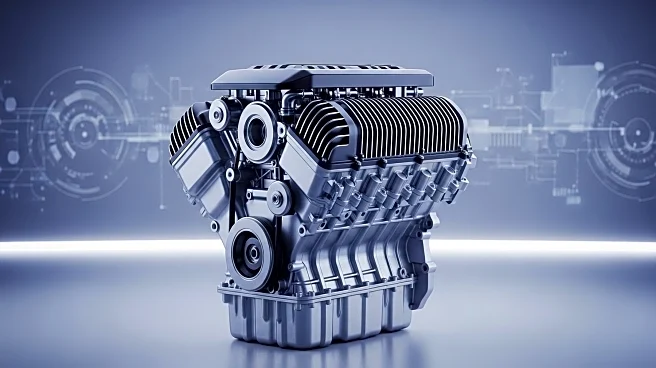What's Happening?
Nissan has introduced a groundbreaking engine technology claimed to be the most thermally efficient ever used in a road car. The 1.5-liter turbocharged three-cylinder engine, codenamed ZR15DDTe, is part of Nissan's e-Power hybrid powertrain and is currently in production for the Europe-market Qashqai crossover. The key innovation lies in the use of cold spray technology for valve seats, which are sprayed directly onto the cylinder head, eliminating the need for separate components. This method enhances the intake port geometry, improving tumble flow and cooling performance. The technology, known as STARC, was first introduced in 2021 but is now being applied in production engines. Nissan claims this advancement raises thermal efficiency to 42 percent, surpassing competitors like Toyota and Hyundai.
Why It's Important?
This development is significant for the automotive industry as it represents a major leap in engine efficiency, potentially reducing fuel consumption and emissions. By achieving higher thermal efficiency, Nissan's new engine could offer better performance and lower operating costs for consumers. This innovation may also provide Nissan with a competitive edge in the hybrid vehicle market, which is increasingly focused on sustainability and efficiency. The use of cold spray technology could set a new standard for engine manufacturing, influencing future designs and production methods across the industry.
What's Next?
Nissan's claims of improved efficiency will likely be scrutinized by industry experts and competitors. The company may face challenges in proving the long-term reliability and performance of the new technology, especially given past issues with variable-compression engines. As the technology is integrated into more models, Nissan will need to ensure consistent quality and address any potential legal or consumer concerns. The success of this engine could lead to broader adoption of cold spray technology in automotive manufacturing, prompting other companies to explore similar innovations.
Beyond the Headlines
The introduction of this technology raises questions about the future of engine design and the role of traditional manufacturing methods. Cold spray technology could reduce material waste and energy consumption during production, aligning with global sustainability goals. Additionally, the focus on thermal efficiency highlights the ongoing shift towards hybrid and electric vehicles, as manufacturers seek to balance performance with environmental impact. This development may also influence regulatory standards and consumer expectations regarding vehicle efficiency.










